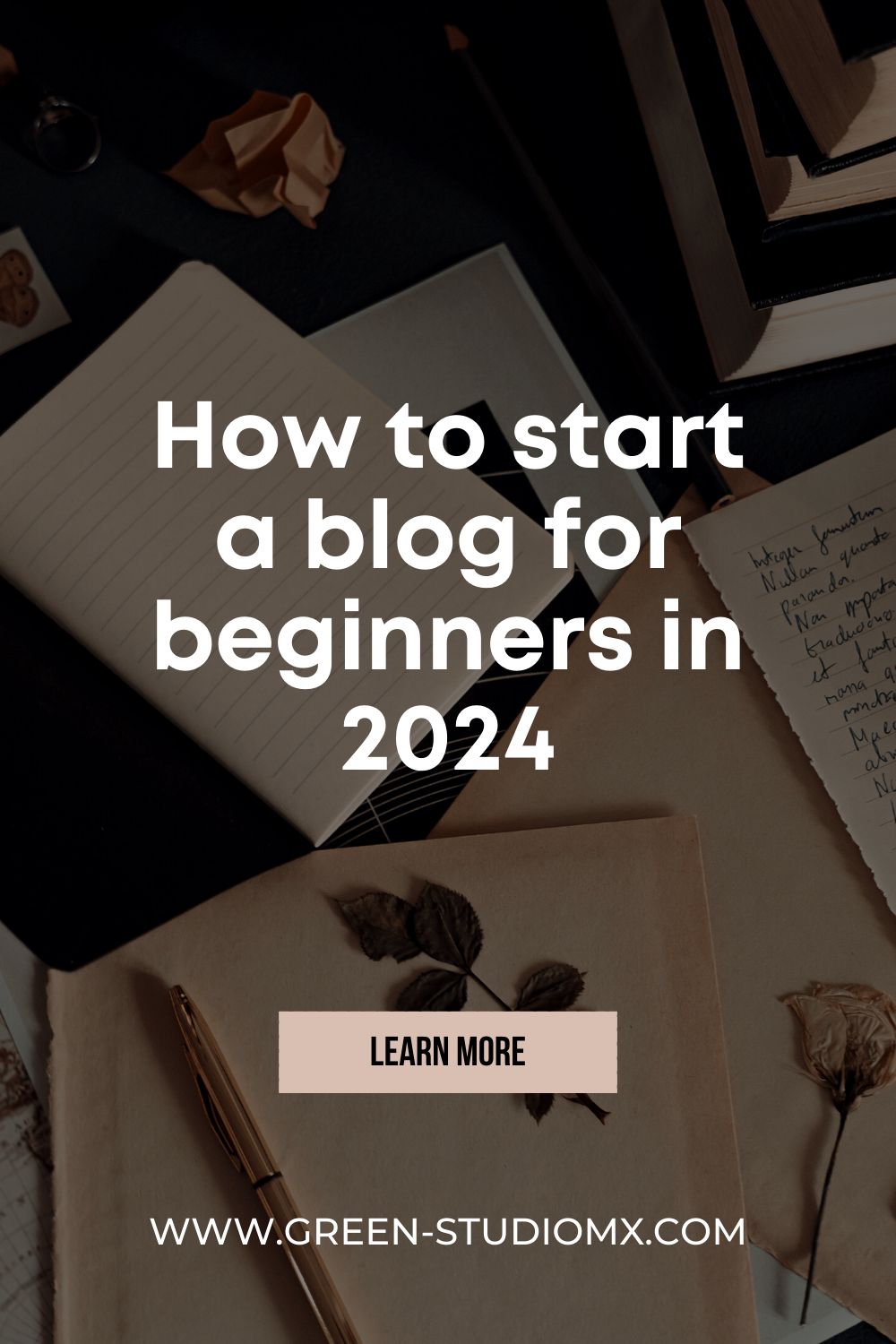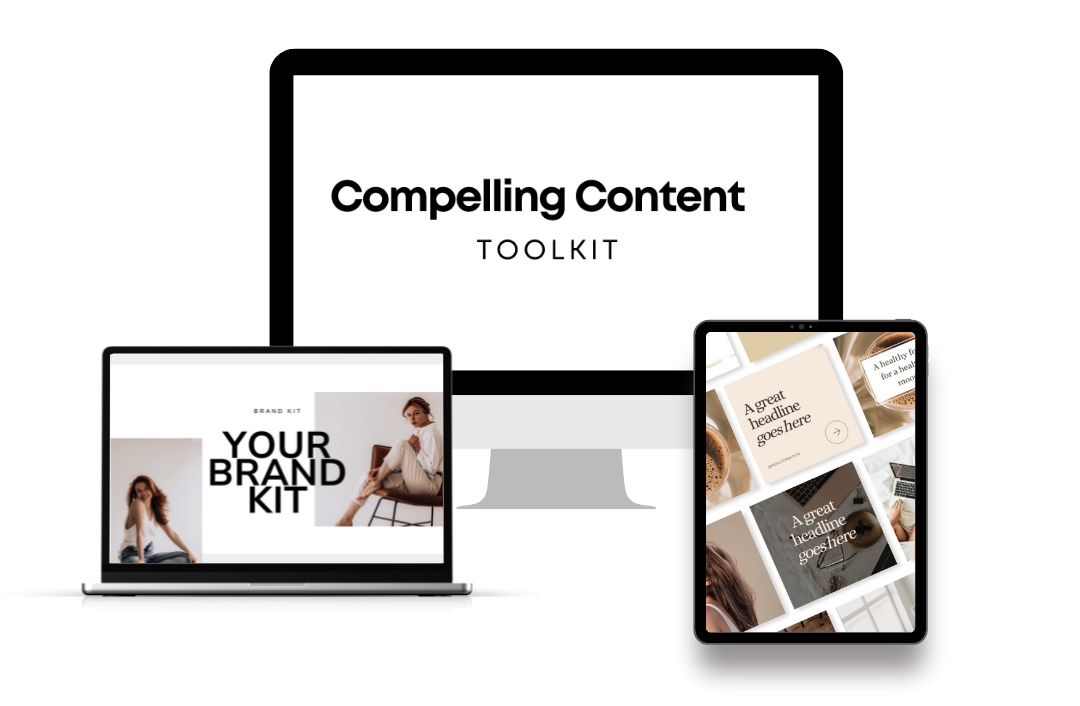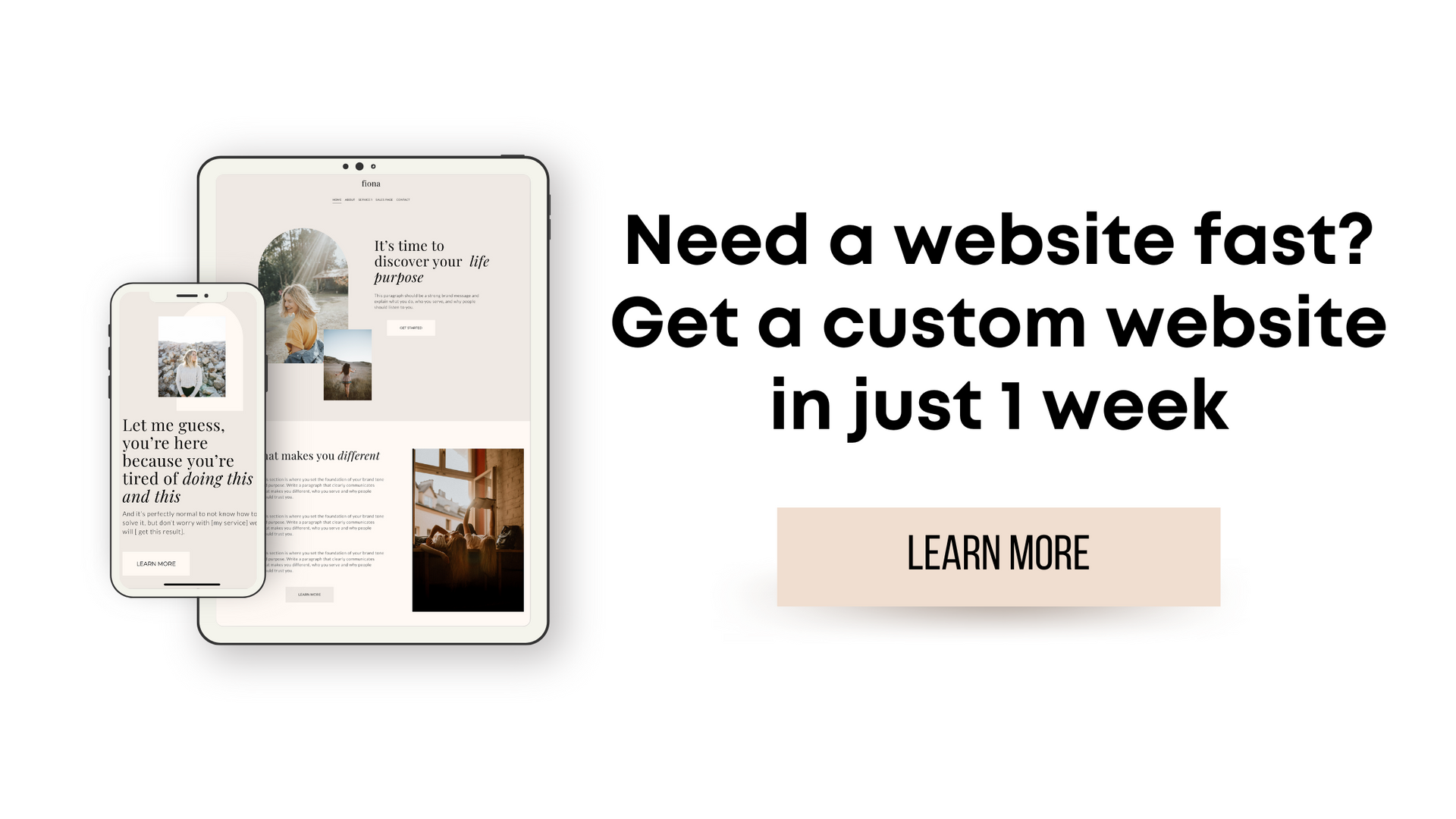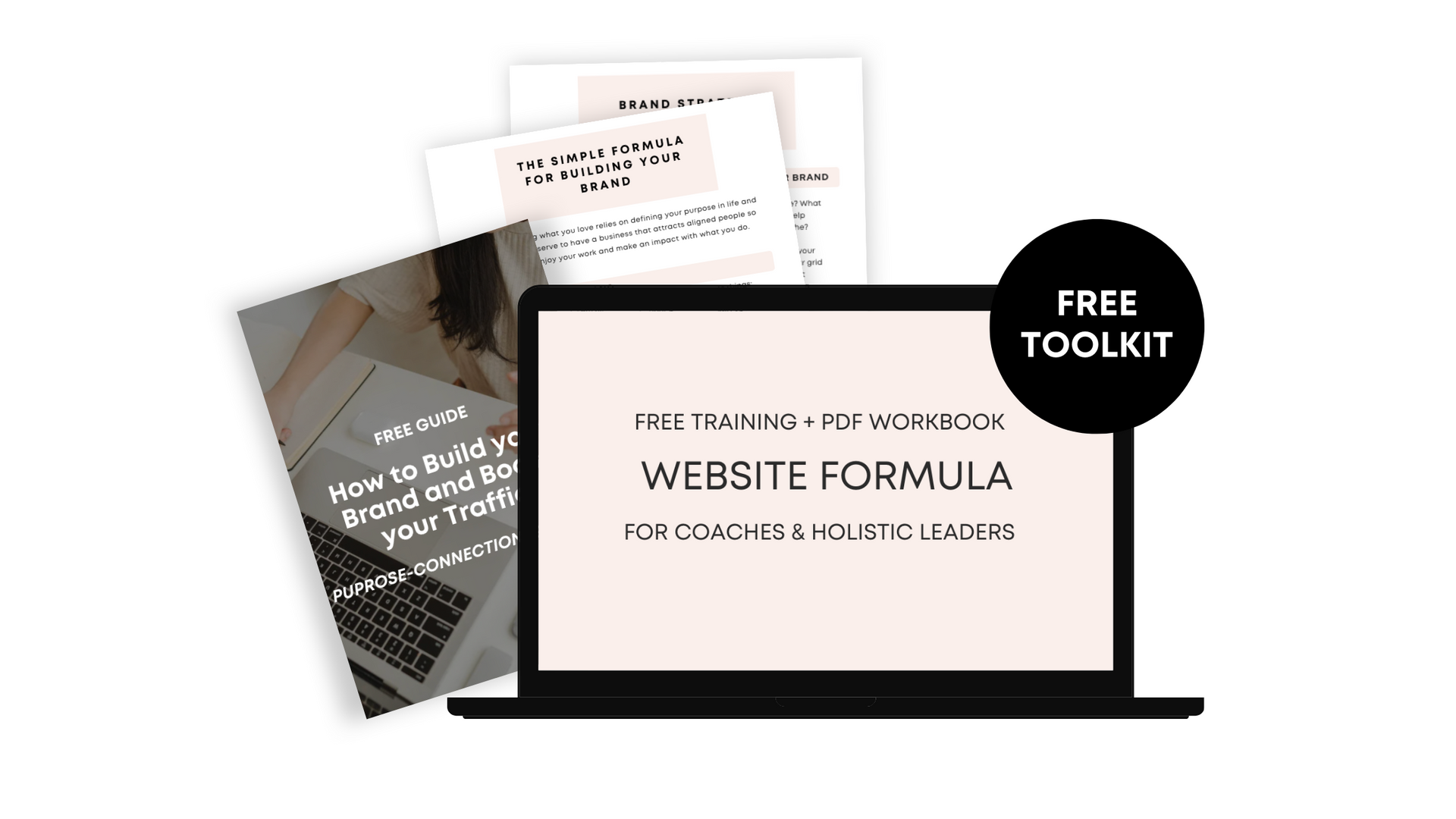How to Start a Coaching Blog for Beginners in 2024
Want to start a blog this year but have no idea where to start? In this comprehensive blog post I’m going to share how to start a blog for beginners, a simple way to start blogging, how to batch produce your blogs, and the key ingredients your blogs need to hook people.
Hey there! If we haven't met yet, I'm Natalia, the founder of Green Studio Marketing. My mission is to help conscious service providers uncover their brand magic and change the world, one website at a time.
If you've ever felt that diving into the world of blogging is an overwhelming task, you're not alone. I'm here to explore a few common myths that might be holding you back I know what you're thinking - blogging is hard, time-consuming, and no one reads blogs anymore. But all of these things are just not true. In fact, with the right approach, it can be THE MOST powerful tool for your personal and business growth. It can become the foundation of your content marketing strategy so that every single word you write reaches multiple platforms and you don’t burn out during the process.
Let’s explore how to make blogging work for you, turning your passion into engaging content that captivates your audience and helps you build a sustainable online presence
Why should I start a blog?
You might be wondering why you should even bother starting a blog. Well, let me tell you, my friend, blogging is a powerful tool for your business.
In case you're new to the online world you may be thinking: "Do people even keep reading blogs nowadays", or "isn't social media and paying ads enough marketing already"? Well, let me tell you one thing: a strategic business blog will help you build trust with your audience and position yourself as an expert in your niche. It'll help you sell without being "salesy" all the time and it will bring in free organic traffic from Google or other search engines.
Get FREE organic traffic and sustainable long-term growth
We all love free marketing strategies right? Well, organic traffic is one of my favorites because it means that you optimize your website with SEO (search engine optimization) in order to create content that gets picked up by relevant search terms and this way people start finding your content online while they are browsing, looking for reviews, ideas or any sort of content related to your niche.
And the best part, is that building organic traffic doesn't really cost you money other than paying for your website hosting and perhaps a SEO tool like Ubbersuggest.
Starting a blog for your business helps you minimize your content marketing efforts
This is why I'm obsessed with creating strategic content for blogs. When you focus most of your efforts on creating content for social media, you depend on algorithms, a good engagement rate and luck to get potential clients to click through to your offers.
On the other hand, when you create your content strategy starting from your blog and cascade it into your social media, you'll not only save time with your content planning, but your marketing efforts will be more focused. Your content marketing will look something like this:
- You plan your blog content categories
- You do keyword research
- You write an engaging post and optimize it for SEO
- You repurpose the copy from your blog into your social media posts, newsletters, stories, etc.
This will help you minimize your content marketing efforts because you'll be creating content that is relevant for your niche and instead of creating 100 different posts, one single blog post can be turned into 10 or more different marketing assets.
Here are some case studies of previous clients whom I’ve helped grow their blogs:
- My client Jessica invested in a robust SEO strategy for her local business and she grew her traffic +500% and went from zero traffic to a steady flow of monthly inquiries via her new website
- After managing a blog for a wellness brand for over 3 years we started with 1-2 blogs per month at first for the first 2 years and then doubled the content strategy to 4 blogs per month and the results were increased organic website traffic and ranking for 3k keywords.
- Another one of my clients was in a very specific niche. For the first year she didn't rank for any keywords, and in the second year of consistent blog content she now ranks for 1.8k keywords. The number of monthly visits does not determine the success, relevant traffic is more important than massive traffic that doesn't lead to getting qualified leads looking for your services.

How do I blog with no experience?
Don't worry if you're a newbie to the blogging world. We all start somewhere! The key is to be authentic and write about what you're passionate about. Start by brainstorming topics that resonate with your audience and create an outline for your blog posts. And remember, practice makes perfect! The more you write, the better you'll become. However you do need to
learn about SEO so that you can write posts that actually get found by Google
How do bloggers get paid and make money?
There are several ways bloggers can monetize their blogs. You can earn money through sponsored posts, affiliate marketing, selling digital products or services, or even by offering coaching or consulting. It takes time and effort to build a monetizable blog, but with consistency and the right strategies, you can turn your passion into profit.
Where can I start a blog?
When it comes to choosing a website platform for your blog, the best website platform doesn't exist. Just pick your favorite and compare them all in this blog post about the
best website platforms for service providers.
5 essential tips for blogging for beginners before you start your blog
Before you jump into the blogging world headfirst, here are five essential tips to keep in mind:
1. Identify your target audience: Know who you're writing for and what they want to read. This will help you create content that resonates with your ideal readers. Here you can read more about
defining your ideal client.
2. Research keywords: Keywords are the key to improving your blog's visibility. Use tools like
Ubersuggest to find relevant keywords for your niche.
3. Create a content calendar: Consistency is key in the blogging world. Plan your blog posts in advance and stick to a schedule to keep your readers engaged.
4. Create a lead magnet: Building a community around your blog is crucial. You’ll need to make sure to create a lead magnet so that you can start building a database of leads and blog readers that you will monetize or turn into clients later on.
5. Plan your website sections and blog categories: Don't just hit publish and hope for the best. You need to plan your website so that you have a solid strategy and your blog can stand out from the crowd.
A simple way to start a blog for beginners step by step
Ready to start your blogging journey? Here's a step-by-step guide to get you started:
1. Choose a niche
Now that you defined your ideal client you need to find a specific topic or area of expertise that you're passionate about and that aligns with your target audience's interests.
2. Set up your blog
Make sure to pick your favorite website platform and setup your blog.
3. Craft your brand message:
Define your
brand voice, values, and mission. This will help you create cohesive and impactful content. A brand that has no voice never gets listened to. If you want to learn how to start a successful blog for your business, you need to bring your personality into your content. Otherwise it'll be dull and boring. People listen to what other people have to say, so spend some time defining your brand values and make sure they are in line with the tone and key message you want to put out into the world.
4. Brainstorm blog post ideas thinking about the problems you can solve with your content
Use tools like
Answer the public to find popular topics in your niche. Make a list of potential blog post ideas to get your creative juices flowing. Your content should never be about you, it should always be around how your brand can make people's lives better. So brainstorm what kinds of pain points your audience may have and make a list of all of the questions or frustrations they may have. All of these things can be turned into resourceful blog content.
Now it's time to break up your content pillars and key message into tangible blog post ideas. I like to have a complete database of blog post ideas on Google Sheets or on my notes app. It's very important that you have a safe online space to write down ideas that pop into your head when you're in the shower. You'll want to do keyword research and then format those ideas into SEO friendly blog titles and posts.
5. Write, edit, and optimize
Start writing your blog posts using your chosen keywords. Edit and proofread for clarity and readability.
This next step is to make sure that you're producing content from different categories so that you can keep things fresh for your audience.
Then you'll want to make sure that each post aims to rank for one main keyword and this particular keyword must be repeated on:
- Blog title /URL
- Intro and sprinkled in the copy
- Alt text
- Meta description
You'll also want to choose keywords that have low competition so that you have higher chances of ranking for those keywords easily.
And one final thing is you need to create a blog link building strategy to build your online domain authority which is a ranking that search engines give to your site that boosts your overall SEO so that you can rank higher as well.
6. Publish and promote with your content strategy
Hit that publish button and share your blog posts on your social media platforms, email newsletters, and relevant online communities. My favorite is using a
Pinterest strategy for sharing your blogs.
7. Analyze and refine
Keep track of your blog's performance using tools like Google Analytics. Analyze which posts perform well and adjust your content strategy accordingly.
You won't have a successful blog if you don't track the results. This is where having a keyword research tool becomes extra helpful. You'll want to keep track of the keywords you are trying to rank for, and make sure you make tweaks to any suggested edits these tools recommend in order to rank higher.
I personally love
Ubersuggest and it's the tool I use for my business and clients because it allows me to track up to 100 keywords for my business and gives me a ton of content ideas for how to format my blog posts.

How often should I blog for my business in order to get results?
This is a tricky question to my taste because I like to preach a "quality over quantity" mindset in our marketing efforts. I have worked with some clients where we blog 1 post per month, however, a slow and steady blog schedule can be a really long term traffic growth strategy. Some of my clients were completely aware of this and don't mind starting small.
But if you really want to see results in the first year of blogging, the more content you can create will directly translate to boosting your traffic. Currently, I like the sweet spot of blogging at least once per week. Do bear in mind that if you want to commit to a schedule of writing 4 blogs per month, you must really focus on quality content. There's no point in blogging even daily if your content is repetitive, and doesn't engage your audience.
How long does it take for a blog to rank on page 1 on Google?
This really depends on a lot of factors like the Google algorithm, your content quality and your domain authority. I've seen results in ranking as fast as 24 hours for a search term that has low competition and in other niches/websites it has even taken us a year to rank for a specific search term. So if you're interested in investing time in professional blogging, you have to understand that SEO works, but it is a long term stable strategy that will allow you to rely less on social media and paid advertising. If you're in it, you need to have patience and a marketing budget to hire a professional if you don't want to do the blogging on your own.
How long should my blog posts be?
Again this also depends on the type of content you are creating. For really in-depth research type of content, you'll want to write between 1,500-3,000 words. Writing more than 2,000 words can get a little wordy for blogging, in the end people want quick reads.
If your content is more resourceful and entertaining like list articles, how to posts, gift ideas, recipes etc, anything in a range from 700-1,000 words will be just fine.
In the end, Google shows on page 1 the type of content that is relevant to the search. So if a recipe is relevant and is as short as 400 words, you don't need a 2,000 word blog post for a recipe. On the other hand, if you google the search term you want to rank for and see that most articles are around 1,000 words, then that's what you want to aim for.
How to batch produce your blogs to save time and minimize your marketing efforts
One of the secrets to successful blogging is batching your content creation. Here's how you can do it:
1. Set aside dedicated time: Block off specific time slots in your schedule for writing and creating content.
2. Create an outline: Before diving into writing, create an outline for multiple blog posts at once. This will help you stay focused and maintain consistency in your content.
3. Write in bulk: Instead of writing one blog post at a time, write multiple posts in one sitting. This way, you can take advantage of your creative flow and save time.
4. Edit and schedule: Once you've written your batch of blog posts, edit them all at once and schedule them for publishing at regular intervals. This way, you can maintain a consistent posting schedule without scrambling for content each week.
Key ingredients your blogs need to hook people
To make your blog posts irresistibly captivating, here are a few key ingredients you should include:
1. Attention-grabbing headline: Your headline should pique curiosity and entice readers to click and read more.
2. Engaging introduction: Start with a compelling hook that grabs your readers' attention and makes them want to keep reading.
3. Valuable content: Provide valuable and actionable information that solves your readers' problems or fulfills their needs.
4. Visual appeal: Incorporate eye-catching images, videos, or infographics to break up the text and make your blog posts visually appealing. Here are the
best places for sourcing free and premium stock images.
5. Call to action: Encourage your readers to take action at the end of your blog posts, whether it's leaving a comment, sharing the post, or signing up for your newsletter.
Wow that was a lot I know! Blogging for business takes time, so if you want to speed things here's two ways I can help you
Join my Blogging Basics Masterclass
- Boost your website's traffic in the next 12 months
- Plan a year of strategic blogs in just one week
- Never worry about how to do keyword research or what to write on your blogs ever agian
Join the Blog and SEO Masterclass
Book a blog VIP day
I'm all about being transparent. Even if you have all the skills to learn how to start a blog for business, learn basic SEO tactics and keyword research, blogging for business takes time to kick in. It takes time to write 700-1,500 word articles, edit them, upload them to your website, tweak them for SEO and then track their success.
So if you'd like to save time in your business, I offer professional blog VIP days where we work on an in-depth one year blog strategy that you can easily implement and produce on your own so that you don’t have to waste hours and hours figuring this out on your own and learning to become an SEO pro.
It'll allow you to grow your organic traffic, build your online reputation and position your brand as an authority in your niche. You can read more about my
blog mentoring and VIP days here.

* AI Disclosure: This content may contain sections generated with AI with the purpose of providing you with condensed helpful and relevant content, however all personal opinions are 100% human made as well as the blog post structure, outline and key takeaways.
* Affiliate Disclosure: Some of the links on green-studiomx.com may contain affiliate links meaning that I will get a commission for recommending products at no extra cost to you.
Thank you!
Please check your email and spam folder to start getting mindful marketing tips.
WELCOME
Welcome to Green Studio
Hello! I'm Natalia. Latina, web design expert and SEO nerd. I help ambitious life coaches, therapists and holistic leaders amplify their magic, gain visibility, and simplify their marketing efforts through strategic web design and content.
Check out my website education resources:
If you loved this post you're gonna love these:

BTW, I'm Natalia
Web design expert and automation nerd
I’ve built an online business which has allowed me to double my income, and quit my full time job all thanks to one thing!
MY WEBSITE!
After serving +100 clients and students across several industries, handling blogs and writing professional copy for clients, I know the ins & outs of building a website that attracts and writing content that converts.
Plan & organize your content strategy👇
Learn how to build a brand that demands attention with a compelling content strategy that turns followers into clients and gives you back your TIME.

Join Green News
A weekly reminder to slow down, enjoy life and build your mindful business one day at a time.
green studio
Bilingual Strategic Web design and resources for life coaches, holistic leaders and mental health professionals. We are located in Mexico serving USA & Worldwide. Contact | Become a collab partner
Green Studio - Privacy Policy








